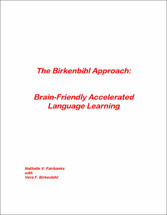Search and Find
Service
I. Contrasting Traditional Approaches to Language Learning and the Birkenbihl Approach (p. 8)
1. The 4 Steps of Conventional Approaches
Step 1: Vocabulary Memorization
Issue: From the very beginning, language students are asked to pronounce words with which they are not familiar. Most of the time, their pronunciation of these words is not correct. A German speaker learning English would be a typical example: he would pronounce silent letters, thus saying [knaif] for knife, or [wrait] for write. Students have a tendency to mispronounce words with unfamiliar phonemes (namely those containing the "th"), and to resort to the native language’s pronunciation rules in attempting to produce new target language words. E.g., one of Ms. Birkenbihl’s seminar participants learned to say [altuf] for although… Consequences:
1- Students are unable to recognize the word later when it is pronounced correctly or in context, even though they supposedly learned it.
2- Students will not be understood when they speak. Keep in mind that bad pronunciation habits are very difficult to unlearn and re-train. It is also a very frustrating and time-consuming task.
3- When students memorize vocabulary "pairs" (e.g., Tisch = table), they will, upon hearing the phonemes for "Tisch" first translate to "table", then access the table "concept" that exists somewhere in their mind. This is the least efficient way to acquire vocabulary, and more often than not results in very poor listening comprehension skills.
All prices incl. VAT












